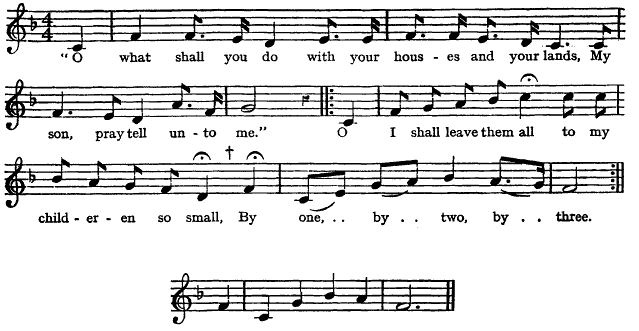Lucy- Mrs. Dann (Cottenham) 1932; Collected pre-1904
[From Mary Humphreys, 2006: Ella Bull wrote down the song from memory of Charlotte [Dann] singing it some years previously and subsequently seems to have checked with her to see if she had any more of the song. Unfortunately she had no more than Ella had first recalled. Ella sent the song to W. Percy Merrick in approximately 1904 and thence it was published in the Journal of the Folk Song Society.
Ella said in a letter to Lucy Broadwood that Charlotte learned most of her songs from her mother, Hannah Few from Over (a village on the edge of the Fens) but she could not recall where she learnt Lucy. Ella's view was that in Cromwell's time some Scots prisoners were quartered in North Cambridgeshire and the song may have come from there.The use of the word "gang" in the last verse is suggestive of this hypothesis. I have never heard Cambridgeshire people say "gang" for "go". ]
Two English Folk Songs
Journal of the English Folk Dance and Song Society, Vol. 1, No. 1 (Dec., 1932), pp. 52-54
LUCY
[LIZZIE WAN.]
Noted by ELLA BULL Sung by MRS. DANN, and W. P. MERRICK. Cottenham, Cambridgeshire.

1. "O what shall you do with your houses and your lands,
My son, pray tell unto me."
O I shall leave them all to my childeren so small,
By one, by two, by three.
O I shall leave them all to my childeren so small,
By one, by two, by three.
2 "O, when shall you turn to your own wife again?
My son, pray tell unto me."
"When the sun and the moon rises over yonder hill,
I hope that may never, never be."
When the sun, etc.
3 "O what shall you do when your father comes to know?
My son, pray tell unto me."
I shall dress myself in a new suit of blue,
And gang [or sail] to some far country.
I shall dress," etc.
4 "O, is this the blood of our greyhound
Or the blood of our Lucee? "
"O, this is not the blood of our greyhound,
But the blood of our Lucee."
O, this is not, etc.
5. . . . . . . . .
O, what did he do there? you very soon shall hear.
He shed poor Lucy's blood.
Two versions of the text of this ballad, taken from the collections of Herd and Motherwell, are given in Child's English and Scottish Popular Ballads under the title "Lizzie Wan " (No. 5I), and Cecil Sharp noted in Kentucky a version of the text with tune, which will shortly be published in the 2nd edition of English Folk Songs from the Southern Appalachian Mountains (Oxford University Press). I know of no other versions.
The question and answer stanzas are to be found in " Edward" (Child, No. 13), but in this ballad it is the brother (or sometimes the father) who is the victim of the murder, whereas in Lizzie Wan it is the sister.- M. K.
This corrupt and fragmentary version of "Lizzie Wan" seems to represent a late off-shoot of a ballad-group of which various Scottish traditional versions are known, and which may be classed as stories of "unhappy recognition." "The Bonny Hind," "Sheath and Knife," and "The King's Dochter Jean" are variants of the same theme. Similar tragic discoveries of too near relationship- the story is clear in these earlier forms-are found in Scandinavian balladry and in the Finnish Ralevala, where the unhappy sister of Kulleroo drowns herself on learning the dreadful truth. Such ballads (leaving the Oedipus myth out of account) may be rooted in an early stage of society in which families were liable to be forcibly separated by war, by long journeys, wanderings, or exile, and lack of communication. Thus a pair of lovers, or strangers meeting in a love-adventure, might make as tragic a discovery as the "rank robber' of "Babylon or The Banks of Fordie," who unknowingly slew his sisters, or the host and hostess in "The Black Spot," who unwittingly murdered their own son for his gold. In the "Bonny Hind" the sister stabs herself to death on the mutual disclosure, and the savagery of "Lizzie Wan"-where the brother hacks his sister to death in revenge for her betrayal of their secret seems to point to the original situation having been forgotten.
No doubt in later and more settled times it would become less easily credible that a brother and sister should be unaware of their blood-relationship. But the "Lizzie Wan" story is on a lower and less poetic plane than the "Bonny Hind," and lacks the finer motive of the ill-fated sister's voluntary death-the hari-kari of her age. And if "Lizzie Wan" be a later and degraded form, then the dialogue is probably borrowed from either "Edward" or "The Twa Brothers" to fit in with a bloodstained sword of even more shameful significance.
The tune-which has a strong Scottish flavour-is a variant of the familiar "Little Musgrove and Lady Barnard" air first printed by Motherwell and then by Chappell, (who took the liberty of raising a flat seventh occurring in it). Cecil Sharp noted many Appalachian versions of the same tune both to "Little Musgrove" and other ballads. The "Lizzie Wan" tune in Miss Karpeles's forthcoming Appalachian Folk- Songs is another variant of the same.- A. G. G.